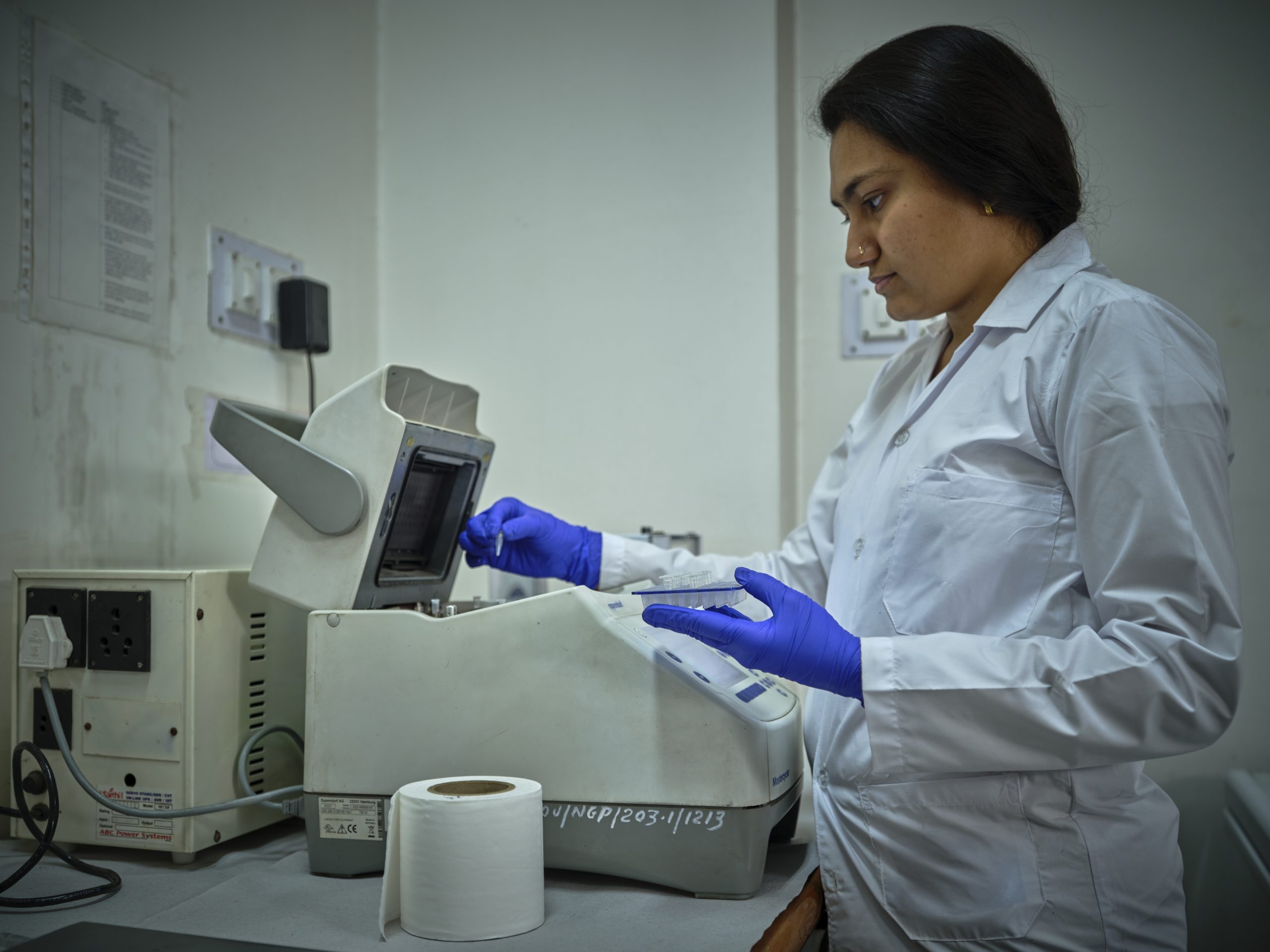
Established in 2004, the Institute of Science offers postgraduate programmes of MSc (Biotechnology), MSc (Biochemistry) and MSc (Microbiology).
The Institute also caters to the needs of industry, academia and research institutes by producing high quality professionals ready for challenging career opportunities.
The Institute offers PhD programme in the various areas of Biology, e.g., Immunology, Genetic Engineering, Cytogenetics, Neurobiology, Agriculture and Industrial Biotechnology, and Physiology to name a few. The Institute also offers PhD programmes in the areas of Physical Sciences through recognised research centres.
The Institute has professionally qualified and experienced faculty members with expertise in the various areas of biological sciences.
The graduates from the institute are well placed in top pharmaceutical companies and academic institutions or actively enrolled in numerous PhD programmes at reputed research institutions in India as well as abroad.

Meaning in English -“From ignorance, lead us to truth”
The Motto of the University has been taken from brihadaranyaka Upanishad – I.III.28. The second line of the Pavamana Mantra explains how to lead the life towards knowledge from ignorance which obscuresour mind in understanding the reality. As the only remedy from darkness is light, the only remedy from ignorance is knowledge.
 Our Vision
Our VisionStudent Centricity
Contribution to the Society
Quest for Academic Excellence
Quality Statement
To develop high quality professionals who reflect and demonstrate values that the University stands for, through innovation and continuous improvement in facilitation of learning, research and extension activities.

या कुन्देन्दुतुषारहारधवला या शुभ्रवस्त्रावृता
या वीणावरदण्डमण्डितकरा या श्वेतपद्मासना।
या ब्रह्माच्युत शंकरप्रभृतिभिर्देवैः सदा वन्दिता
सा मां पातु सरस्वती भगवती निःशेषजाड्यापहा
Meaning – Salutations to Devi Saraswati, Who is pure white like Jasmine, with the coolness of Moon, brightness of Snow and shine like the garland of Pearls; and Who is covered with pure white garments, Whose hands are adorned with Veena (a stringed musical instrument) and the boon-giving staff; and Who is seated on pure white Lotus, Who is always adored by Lord Brahma, Lord Achyuta (Lord Vishnu), Lord Shankara and other Devas, O Goddess Saraswati, please protect me and remove my ignorance completely.
श्लोक अर्थ – जो विद्या की देवी भगवती सरस्वती कुन्द के फूल, चन्द्रमा, हिमराशि और मोती के हार की तरह धवल वर्ण की हैं और जो श्वेत वस्त्र धारण करती हैं, जिनके हाथ में वीणा-दण्ड शोभायमान है, जिन्होंने श्वेत कमलों पर आसन ग्रहण किया है तथा ब्रह्मा, विष्णु एवं शंकर शङ्कर आदि देवताओं द्वारा जो सदा पूजित हैं, वही सम्पूर्ण जड़ता और अज्ञान को दूर कर देने वाली माँ सरस्वती हमारी रक्षा करें।
Effective teaching-learning process is a sine qua non for academic success. Nirma University follows outcome-based education to develop the requisite knowledge, skills, attitudes and habits of students. The purpose of the teaching-learning process at the university is to be student-focussed. Thus, the university endeavours to promote student-centred learning. Each student is motivated to take the ownership of his or her learning and reflect on the learning process. Further, the various institutes of the university are actively shifting from lecture based teaching to experiential learning.
Project-based learning is another salient feature of the teaching-learning process. Students work on a host of projects in different courses as well as across courses. Internship and project-based courses are part of different curricula. These courses are supervised and students are given sufficient support by the teachers to apply their learning and learn from real life situations.
Each programme has its programme learning outcomes that are derived after consultation with all stakeholders, benchmarking and intensive internal discussions. Then, course learning outcomes are developed on the basis of programme outcomes. The course content and assessment are based on the course learning outcomes. Each programme has mechanisms for the assurance of learning. For example, the rubrics are developed on the basis of course learning outcomes and various assessment mechanisms are developed to assess the level of learning among students. Finally, assurance of learning results in improvement in the teaching-learning process.
Continuous evaluation of learning is followed at the university. Efforts are made to measure cognitive as well as applied learning. Project work, quiz, problem solving exercise, classroom assessment methods, end-semester examination, etc. constitute the different components of the overall assessment. Moreover, students are provided feedback on their work with a view to improve their academic performance.
Curriculum and course upgradation is a continuous process. Its purpose is basically to enhance the learning of students. Business realities are changing fast. Therefore, the various institutes of the university modify and upgrade their curricula and courses from time to time to provide the latest knowledge and skills to our students. Assessment system at the university is open and fair. Students are shown their assessed work and are allowed to discuss their scholastic performance with the instructors.
Academic Development and Research Cell (ADR Cell), an important institution at the university, helps the various institutes to continuously upgrade the quality of the teaching-learning process through research, training, academic audit and quality assurance.
The objective of the Master’s Programme in Biochemistry is to prepare students for future careers in the various fields in which a core understanding of the chemistry of biological processes is important. Scientific disciplines such as human biochemistry, medical biochemistry and biotechnology will enhance the understanding of human health. The Biochemistry Programme will benefit the society on the whole by adding to the highly skilled scientific workforce, particularly for the biomedical research sectors, in the academic, industry as well as for research laboratories across the country and the globe.
The objective of the Master’s Programme in Biotechnology is to equip the students to apply knowledge of molecular mechanisms of cellular processes in living systems including microbes, plants, and higher order organisms to applied aspects. The laboratory training in addition to theory is included to prepare them for careers in the industry, agriculture, and applied research where biological system is increasingly employed. Basics and current updates in the areas of Industrial Microbiology, Fermentation Technology, Agriculture & Environmental Microbiology are included to train the students and also sensitize them to scope for research. The Masters in Biotechnology Programme will address the increasing need for skilled scientific manpower with an understanding of research ethics involving animals and humans to contribute to application, advancement, and impartment of knowledge in the field of biotechnology globally.
The objective of the Master’s Programme in Microbiology is to equip the students to apply knowledge of prokaryotic and eukaryotic cellular processes, classification, interaction of microorganisms among themselves, with physical and chemical agents and higher order organisms . The laboratory training in addition to theory is included to prepare them for careers in the industry, agriculture, and applied research where biological system is increasingly employed. Basics and and current molecular updates in the areas of Industrial Microbiology, Fermentation Technology, Agriculture & Environmental Microbiology are included to train the students and also sensitize them to scope for research. The Masters in Microbiology Programme will address the increasing need for skilled scientific manpower with an understanding of research ethics involving microorganisms to contribute to application, advancement and impartment of knowledge in the field of microbiology and molecular biology globally.